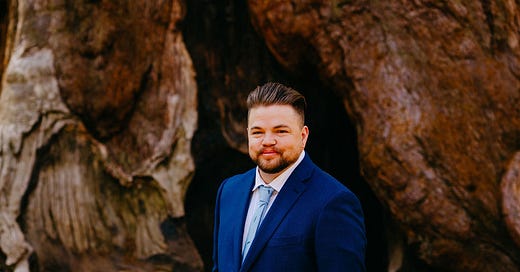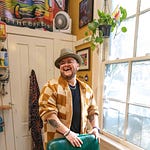TNG Worklife is a podcast and ongoing conversation about the work-life experiences of the transgender, nonbinary, and gender expansive communities.
You can find us on Apple, Spotify, and Instagram.
This podcast is always free, and if you enjoyed it, you can support the work by subscribing for as little as $8 a month.
About James Husband
TIDAL Website: https://www.tidalnola.org/
LinkedIn: https://www.linkedin.com/in/james-husband-mph-1460601aa/
Credits
Opening music - Abstract Fashion Pop by QubeSounds
Closing music - Where the Light Is by lemonmusicstudio
Episode Transcript
[upbeat pop music plays]
Kai Stowers: [00:00:00] Hello, and welcome to Season Two, Episode Five of TNG WorkLife, a podcast about the experiences of the trans, non binary, and gender expansive communities in the workplace. This season we're focusing on the strength we gain through community and partnership. You can join our community by signing up at tngworklife. substack. com which will deliver each episode, including the full transcript, right to your inbox.
Today I'm speaking with James Husband about what it means to be queer in the South. We talk about the importance of community and collective work and what we've had to learn ourselves to become better community members.
The wisdom James shares is vital now more than ever as government systems fail to protect the fundamental human rights of the trans, queer, and other marginalized communities. [00:01:00] I left our conversation newly reminded of the power we have when we work together.
Hello, James, and welcome to the podcast.
James Husband: Guys, it's great to be here. It's nice to say hello all the way from the Deep South.
Kai Stowers: You have a background in nonprofit work and public health.
What are some of the things that drew you into these fields?
James Husband: We're all impacted by public health every day, whether you get in your car and click in your seatbelt, whether you go to a restaurant, get your food served to you, there's different layers of public health that's impacting our lives.
And basically what public health is, it's how we decide to keep each other safe. A lot of folks kind of cringe when they hear the word public health now, because I think there's this idea that it's talking about infringing upon our freedoms and stuff like that, which is kind of a much more complicated question,
yeah,
Kai Stowers: there's a tension between individuality and The ways we agree to keep each other safe.
James Husband: That's one of the first few times I've heard somebody say it like that of public health is this tension [00:02:00] between regulations to see how we decide to keep the public safe and also how we decide as individuals to participate in that public health safety.
I fell into it because one of my friends was doing rapid HIV testing and they had an opening at the clinic.. And I was thinking about doing psychology and
HIV Rapid testing could give me an experience of whether or not I like to do one on one therapy, because rapid testing is essentially a mini, not therapy session, but it's a mini way to interact with a person on an individual level and walk them through something that could be high stress. So I applied I got an interview and I met with my supervisor and we were talking about it. I didn't have any experience I just had the lived experience of being a trans queer person And I cared about people and was willing to learn about how HIV testing works and the things that go with that.
Kai Stowers: Great. Yeah. And when you think of working in public health, what [00:03:00] are some of the things that motivate you, that keep you engaged, keep you coming back to the field?
James Husband: Yeah.
What keeps me here is I feel really good being able to make space for other people's voices.
I'm white and now that I'm, now that I transitioned, I'm cis passing and I have a lot of male privilege and a lot of people look to me in the room first, depending on who's sitting next to me. So what. keeps me in public health is this desire to do my best to speak for those folks who are underserved, who haven't been given what they deserve because our system was set up to not give them those things like trans folks, black folks, Latinx folks, lots of underserved communities.
And you'll hear those communities talking about their needs, but that doesn't mean that it's always getting represented to the people who are in positions of power. The goal is to authentically use my power to make space and room for those who still have the least power and who need the most.[00:04:00]
Kai Stowers: Yeah, there's a gap. I see this so much in the work I do. It's not that underserved communities aren't speaking up and aren't advocating for their needs. But something happens and people in leadership positions don't or can't hear it. And maybe this is a good time to tee up the work you're doing with TIDAL.
James Husband: Yeah, definitely. And your point about how the leaders at the top, they hear what people are saying, but it gets lost. And that's exactly where TIDAL came into play. A few folks at an nonprofit here had applied for a grant . it was an HIV and local healthcare clinic that was serving largely LGBTQ plus populations in the New Orleans area.
So the trans work committee had managed the grant to provide a workshop and to provide services on finding out what the needs in the trans community in New Orleans were.
We did a large scale focus group and then took that information and then put it into this guiding five point plan and that's information's all on our website of how TIDAL came to be and [00:05:00] what still guides us.
James Husband: But once that grant cycle at the health care clinic ended, we wanted to do something more. And we're like, well, what is it? How does it not stop here? And a few of us met outside of the clinic and outside of work hours and had said we should more formally form a collective.
And we kind of workshop some stuff and TIDAL came up, which for the longest time was hard for me to say rapidly.
Because it was a lot of letters, but it stands for T I D A L, Trans Inclusive Development Advocacy and Learning.
Kai Stowers: Yeah, and can you say a bit about, when you use the word collective, what does that mean and how you're organized and how you relate to each other?
James Husband: So, I have learned what a collective is through TIDAL.
I didn't really know what a collective was. I think part of that is owed to where we are in the South of things like unions exist, but I don't think they exist and operate in the [00:06:00] same way that we might have seen from California or the Midwest.
My partner's interpretation of a union is different from my interpretation because she has experience where a union worked and functioned, whereas in the South, I think it's hard to talk about the South without talking about slavery and enslaved people at all. But I do think that that's where this lack of understanding of shared work as workers power is, like, missed amongst white folks. We don't have that history of knowing our collective power beyond leading folks and not even leading really that was poor choice of words, but tying back to slavery and trying back to enslave people. So that may seem like a tangent, but feels very important. Because I learned what a collective is from other folks who had this knowledge, who had this knowledge to their own histories, their personal histories, their non white histories.
So all that to say what a collective is, it's a shared work group where we have mutual [00:07:00] understanding and one voice is not more powerful than the others and we do our best to honor all of our voices together So it doesn't mean that disagreements don't happen.
It doesn't mean that we agree a hundred percent all the time It just means that as a collective we have to figure out what is the most powerful collective voice and what is the most powerful agreement and how do we get to that? Which has been a process for us to figure out.
Kai Stowers: Yeah, and I'm reflecting on when you say, as a white person, this idea of a collective was new to me.
And this makes sense to me too, because certainly before I transitioned, there's ways that the hierarchy, the systems, worked well enough for me that I could just rely on the systems and structures. And after I transitioned, I was like, Oh, wow, I am outside of these systems and structures
and community and collective and these ways of relating on a more human basis are suddenly really important in a way I hadn't appreciated before.
James Husband: Yeah, I think too, when the way that we're taught in America, it's a very [00:08:00] binary system, right? It's male or female, and then together, those folks form a union or get married, and that is the most important unit.
So this idea of community is not really, I feel, talked about amongst, Just our work history and our American ideals. It's really much like a mom, dad have kids and that's your unit. And that's kind of it. So there's no real cultural understanding and support of what is a unit beyond two to five people look like, and how does an intergenerational unit operate,
Kai Stowers: right?
And what are some of the ways that you organize as TIDAL to create this more collective way of approaching the challenges that trans, non binary, gender expansive folks are facing, especially in Louisiana and the Deep South.
James Husband: We organized in summer of 2020, and then started meeting on Zoom, cause we couldn't meet in person. We would meet every Wednesday and we also didn't have a requirement that you had to be in Louisiana to join.
[00:09:00] We also don't have any membership or due fees. We started a few projects. We talked about trainings and then we would have new people join and old people would be like, hey, I'm at capacity.
I have to step back. I want to say sometimes when it's traditional straight folks who hear about TIDAL, they're like, well, how do y'all work?
What's the magic? What is that magic thing that makes it happen? And it's really, there is no magic. It's just trust each other. When somebody says I have capacity, I'm going to do it. And whenever somebody else says I don't have capacity, I can't do it.
I'm out.
Kai Stowers: I saw a recent stat by Kornferry that 50 percent of talent is burned out. Right. . And 50 percent burnout rate is, it's absolutely nuts. Right. And so why wouldn't we step into other ways of balancing how much we work and how much we rest?
James Husband: Yeah. And I would love to say that. I knew about the ethos of, I don't have capacity, I'm gonna step back. I have [00:10:00] capacity, I'm gonna step up. I know that one. I know that I could do it and I'm gonna do it all. That one's so, I got that.
Kai Stowers: Yeah, I've learned that one somewhere.
James Husband: I had to learn from a lot of people in the collective that are much smarter than I am and knew those skills already.
There are three or four people who showed up to the space and they were like, Hey, look, these are things that we've done in other workspaces. We've let people have their capacity and step back.
We've let people step up when they have capacity and then have kind of decided. Whatever that task looks like, work through it and edit it together after. Shared work and share responsibility for getting things done was a big part of what I learned from other people who joined this collective.
It shouldn't be all on one person. Taking that collective ethos and putting it into the traditional nonprofit structure is a challenge that I'm trying to do with the workplace I'm at. If a leader's listening, or if a nonprofit higher up is [00:11:00] listening, or if there's folks who are like, Oh, I work in a nonprofit, I want to start a collective,
how do I do that? We had talked about what the magic was. And I think part of it is you have to start with trust and vulnerability. You have to trust each other. You have to be vulnerable. You have to say, Hey, I didn't do this thing. Cause I forgot, you have to say, Hey, I did this thing and I'm worried it sucks.
Or, Hey, I did this thing and I think it's awesome. What do y'all think? And then you have to be ready when someone's like, I think it sucks. And that's fine. You can say it a lot nicer, but
Kai Stowers: right.
James Husband: A collective is leading with trust and vulnerability and if I have to choose three, I'll say three, trust, understanding, and respect.
Kai Stowers: Gotcha. I'd like to spend a little bit of time talking about what is it like to be trans, non binary, gender expansive in the South right now, and what is the role of a collective like TIDAL in supporting our communities?
James Husband: It's just a softball question there.
Kai Stowers: Right. And, and I ask this because I'm sitting in the San Francisco Bay Area and I talk to [00:12:00] folks who are like, Oh, that's a Southern problem.
James Husband: Yikes.
And I'm like, it is not a
Southern problem. The same tactics that are very well developed in the South are starting to show up in California, for example.
We cannot say that we are completely disconnected from each other just because we live in different parts of the country.
James Husband: Yeah.
Kai Stowers: And so that's part of why I'm teeing up this question because I think your experiences and the wisdom that you've gained in navigating what's a really challenging and often horrific political situation have lessons for all of us.
James Husband: Yeah, I agree so much. And also I appreciate you asking that question because of exactly what you had said.
It can be easy to want to forget about people who live in another state,
Kai Stowers: Out of sight, out of mind.
James Husband: out of sight out of mind. So I think that's a big part of it. I think a big part of it is fear.
People are afraid to be like, man, if they can do that there, do you think they'll do it here? Another thing too, is where our lives are really [00:13:00] busy. And I think we get wrapped up in taking care of ourselves because there is so much trash feelings going on in the world.
So it's hard
Kai Stowers: Yeah, and I think this makes sense too, because this is not an accidental result of these strategies against the trans community. Because when there's a sense of overwhelm, there's that fight flight freeze. And that flight or freeze. Yeah, that's a very human reaction.
Oh yeah,
James Husband: so I understand it, right? I understand why it
Kai Stowers: happens.
James Husband: But at the same time, you asked me earlier why do I stay a non profit? And I think that's part of it. Yeah we're here in the Deep South and
our fitness isn't the best, our health isn't the best, but we have a lot of great things. We have a lot of great food, we have a lot of great people, we have a lot of great traditions. The
Kai Stowers: community, the community in New Orleans, it's hard for me to even to communicate what community is like in New Orleans.
From just the five years I lived there.
James Husband: That's what's really hard is Southerners can be so inviting and welcoming until they've figured [00:14:00] out what they don't like about you and they shut the door. And so, I get invited in a lot of spaces and I feel very safe in a lot of spaces because I'm cis passing.
But they're not getting the full story and the full picture of me. And it's just really unfortunate that our hospitality is great until it's either the racism or the homophobia or the, whatever the ism is that people have are still rooted in and still can't get over or, you know, Still judge people about Right.
I'm like, we were almost there. We were almost there with having the best party ever and the best food. Right. And then you couldn't get over your own feelings and realize that people are different.
Kai Stowers: When we were planning for this episode.
James Husband: Yeah.
Kai Stowers: And you mentioned, in the South, society is just a lot more rule based, and when you said that, I was like, oh, that explains so much, because if you break one rule, so if you come out as queer or trans, I suddenly remember people being like, well, are you a murderer too?
And to an outsider, that doesn't [00:15:00] really track, but if it's about following a set of rules that's been agreed on by society, it makes more sense that with one transgression, suddenly it's, well, what else do you do?
James Husband: I'm really glad you brought that up. And I need to make sure I say New Orleans is not the only place in the South and there are rural
queer people.
And I think,
Kai Stowers: yeah,
James Husband: we are a red state with two or three blueberries and there are rural parts of blue states. , but also rural blue states, I think have different access than compared to rural red states. So I think trying to lead us back to your original question of why should people outside of the Deep South care is, is one we're people, queer people exist here.
You should care about them and you should also care about the non queer people. Sometimes they're a little harder to care about because they're a little more prickly and have a little bit of stuff they need to work on, but, and I've said this to people too, when I get the opportunity to talk on a panel, it's like, I can be out where I live because I feel [00:16:00] safe.
Kai Stowers: Right. And New Orleans and cities across the South had a long history of being bastions for the queer community.
James Husband: And I say that I feel safe being out. But I also look cis,
I'm white. And I also tell people the way I present is not going to be the same way somebody presents in Tallulah, Louisiana, or Bastrop, or Alexandria.
So when I talk to people who do public health work, they're like, how can I get all the trans people and LGBT people to this important public health issue ? And it's, you need to recognize that
we're not a monolith.
Kai Stowers: Yeah. And also it might not be safe for them to show up and identify themselves.
James Husband: Yep.
That's why you have to care. You have to remember that there are people who are not getting the same experience in blue cities and blue states and they deserve to
Kai Stowers: right. Can you tell me some of the things that TIDAL is involved in and TIDAL is doing in the world?
James Husband: Yeah. So the way, partially what we started out to do is train healthcare providers to better provide care for [00:17:00] trans people. And it's going to be great. It's going to be easy. It's going to be awesome. And we're going to do it super quick and super well.
And then we did a few trainings and we were like, Oh, this is going to be different than we expected.
Kai Stowers: The need was bigger than you
had expected.
James Husband: The need was bigger. The money was smaller., the emotional tax, was really a big one. I remember a few of my peers worked with a group where some people in the room didn't want to be there. The leaders wanted their staff to get trained, but the people in the room were not wanting to be engaged in there.
So that's a really tough, I mean, it's literally a tough crowd. It's also tough emotionally.
Kai Stowers: You can get the information out there and the organization still needs to do more about changing their systems and structures to actually create inclusive places for our community.
James Husband: I guess I can go home now. You hit it right on the head perfectly. I tell people that too, right? Also, when it comes to what [00:18:00] makes our healthcare agency, LGBT aware and competent, it starts with the culture and the system changes and the system's processes.
So we learned that experience and we knew that the culture was part of it. We knew and we're aware.
Kai Stowers: Cause many of you had worked in that health care system before. Yeah.
James Husband: Nobody was new to trainings really, but we were new, to working with healthcare orgs or other organizations whose leaders were excited to have it
but not everybody was excited to have it. So we did training for a little bit. We're still doing training. And then at the same time, every collective member had different pockets of what things they do and how they organize outside of TIDAL. We had a lot of talent and we had a lot of lived experience doing other things outside of training.
So I know a lot of folks who are on the collective did a lot more organizing . Real name campaign did a lot of work in New Orleans to get the name change fund down to 250 dollars, which I think it used to be 500 [00:19:00] dollars.
Kai Stowers: And that makes a huge difference for people.
James Husband: Real Name Campaign, Breakout, House of Tulip, those are three power houses in New Orleans that are doing trans collective and trans collective organizing. A lot of my peers are plugged into the radical and it shouldn't be seen as radical, but the considered radical organizing community in many different ways.
So we have different information being able to be brought back to us and be activated. Our collective is tapped into showing up for so many other queer people and trans people, because it's part of the culture.
It's part of an unwritten rule of TIDALs. Like if you care about trans people, you care about all trans people.
Kai Stowers: Yeah, and I love those acts of allyship from within TIDAL. And it also makes me want to ask, what are acts of allyship you'd like to see from both our community and allies who are in blue states, who are outside of the South?
James Husband: Yeah. I learned what mutual aid is compared [00:20:00] to charity. Uh huh. So I grew up Catholic, I remember we had bonded about that. Charity is giving people what you think they need.
Right.
Kai Stowers: And it's from a place of, I have, and I know, and I'm going to help you.
James Husband: Yes. Mutual aid is vastly different. It's, I think, much more powerful. Mutual aid is somebody saying this is what I need.
I need a ride to the airport. I need whatever. And we're talking about big asks and small asks. The person who's giving is, Oh, I have
Kai Stowers: that. I have 5 for your 200.
James Husband: Yeah, I don't have 200, but I have 50 or I have 5. And so mutual aid works when a collective works, right? So when somebody says, I have 200 and 20 people go, I have 10, if my math's right, that's 200.
Kai Stowers: And this goes back to the trust and vulnerability you were talking about that makes the collective work.
James Husband: So that's the first thing, right?
First step. Mutual aid. When you follow people from the South, one, if you don't [00:21:00] follow people from the South, follow people from the South. Two, if you follow people from the South, and they share mutual aid flyers, and you'll see all types of mutual aid flyers. You'll see some that say, I need 200. They won't tell you why.
You'll see some that say, I need 500 for rent, or I'm going to get evicted next Thursday. If you want to be there for the South, or for people in general, queer people in general, outside of your blue state, be aware of the mutual aid needs, and redistribute your wealth and the money that you have as often as you can.
Right.
Kai Stowers: Yeah, because I will say 200 gets a lot further in the South than it goes in the Bay Area.
James Husband: Oh, yeah. My second one is pay attention to the folks from that area and the lived experience that is being shared and support those stories. Try and pay those artists, hire those storytellers, pay attention to the local organizations that are doing that work to learn how you should do that work.
Number three is if you visit and [00:22:00] when you visit, if you're visiting in the hospitality area, tip 20 percent all the time, even if the person was not their best that day, redistribute that wealth to the person that's that you're visiting, recognize that you're there for a short time. You don't have to live here.
Don't complain. That if you come to New Orleans, or if you come to even Atlanta, don't talk about how trash the place is and why would people live here? Right. People live here. You can talk about how it might not be your favorite and you might not want to live here, but that doesn't mean that other people don't live here.
Be respectful if you want to come visit.
Kai Stowers: Yeah. bring some curiosity. I mean, there's a lot of reasons to live anywhere and some of them about the local community and support structures that people have in those areas.
James Husband: Yes. Bring curiosity. I love that phrase. I forget about that phrase all the time, but I love it so much.
Kai Stowers: I'll sometimes hear people out here say is, well, I'm not going to go to any city in the South. And sure. If there's an organized boycott, that [00:23:00] makes a difference.
But just as an individual saying, I'm never going to visit New Orleans. Nobody knows you're boycotting it. There's a lot of queer owned businesses in New Orleans. You can go there and absolutely support the queer community.
James Husband: Yeah, 100%.
So I think sometimes people get frustrated is like, well, how can I make direct change?
Especially when we're talking about structures. Cause the first three I mentioned were pretty direct human to human impact. But yeah, how do we tell these large corporations where their concerns are largely profit over people. How do I tell them, Hey, I think this is bad. I remember another sports event that was going to come here, and they had threatened to pull out
because there was some anti LGBT legislation going through, and I think maybe another thing, too. And they were like, if you're not a state that's supportive of all people, then we'll just go somewhere else. Like dollars speak and money speaks and that's a big one. Another big one is paying attention to when public comment periods are open.
When the federal government wants to expand stuff, you have to have public comment [00:24:00] periods to let people say whatever they want to say pros and cons for better and for worse. And a lot of those are open for public comment to where you can say, Hey, look, I think this federal legislation would be great.
That's crucial. I think the other thing too is on a macro level approach is paying attention to national organizations that support local organizations.
Kai Stowers: Because those national organizations are really able to raise money more effectively than smaller ones and the smaller ones understand the local needs.
James Husband: I love to give homework. I'm not a professor yet, but I love to give people homework. I joke about it in my meetings. A book that was really formative in my life experience of organizing and public health and how I show up for people was No More Heroes, Grassroots Challenges to the Savior Mentality by Jordan Flaharty.
Thank you. And he had written a book about Katrina, also, I have not read that one. I believe he is from here. If [00:25:00] you're a white person, it's incredible to read. One, I think it should be required reading, because I think sometimes white folks follow the savior mentality. Yeah,
Kai Stowers: and that's what we've been trained.
Right. We're going to default to it unless we actively go out and learn
James Husband: and for folks who haven't heard of that, the savior mentality is this idea that we will come in and save the people. It. Usually ignores what we had talked about earlier, which is asking people their real need, giving the people the real need versus what your idea of their need is,
Kai Stowers: right?
James Husband: So I learned a lot. They talk about a lot of stuff in this book that can really help people understand why not just checking in with the local folks, but working together with local organizers like TIDAL.
Kai Stowers: I've really appreciated our conversation today, and I'm curious, what is one or two thoughts that you'd like to leave our audience with?
James Husband: I did not arrive here overnight. I'm
Kai Stowers: a
James Husband: white person. I know a lot about intersectionality, how people show up in different [00:26:00] ways, how their identities show up in different ways. That is a brief definition of intersectionality. Feminist principles, how to use my privilege in a way that is uncomfortable for other folks in the room.
Those are all skills that I've had to practice.
Kai Stowers: And I love that you name these as skills. Oh yeah. Right? Because if it's a skill we can practice, we can learn it.
James Husband: Yeah, same with names. I'm terrible with names. I love to, I love to joke with people when I do a training. I'm like, I'm a trans person that's bad at names.
And they're like, what? And I'm like, yeah, that's it. You're not magically great at names and pronouns because you're a trans person. It's a skill set. It's practice. I introduced myself as my name is James and my pronouns are he, him, and 95, 97 percent of my meetings at work. So I'm presenting that expectation to my coworkers that this is something that I will normalize and do.
You don't have to, but I encourage you to. But that skillset has come from 500 meetings with TIDAL. I practiced with TIDAL
Kai Stowers: And I've been to a few TIDAL meetings. And one of the things I've seen is there is a feedback [00:27:00] culture. Yeah,
James Husband: that's a big one. And we can also talk about what's next for TIDAL.
And I think a big thing that's next for TIDAL is figuring out. When a process or when a project that we've done has been been difficult, how do we reconvene, reorganize and show up for what's next? How do we take our collective power and how do we take what we love about the collective and how we acknowledge our capacity and our feelings and our individuality and incorporate it into this world
of productivity, grant reporting, micro grant funding, . So I'd really like to leave people with the fact that I didn't arrive here overnight. You won't either, but you have to do your homework. If you're in a position of power, look at what you can change and what you can't change.
A big thing for me that I try and tell people is. It doesn't have to be a huge change, and if you need to make a small change to leverage changing the culture. That's fine.
Kai Stowers: I absolutely agree. Sometimes [00:28:00] you're going to have the buy in and support from people in power that you can make bigger changes. And a lot of times that's not going to be the case.
So you look at what are the smaller levers I can change and given the political landscape in Louisiana right now, that makes complete sense. All right. Well, thank you so much for the conversation today. Wish you all of the best. And I know you are speaking about TIDAL and there's so many others in the collective who make all of this happen.
So I want to, I want to give a shout out to everyone who is not here on the podcast, but it was absolutely part of TIDAL and all of the amazing work that you are all doing.
James Husband: Yeah. I'm just one voice of many, which feels good because there's gotta be a lot of us doing the work, but I appreciate you letting me be here. I hope that people who are listening, I hope it makes them feel empowered to create change. I hope it makes them feel good about the change and the stuff that they're trying to create. One step at a time, with many people together, can be really powerful.
Kai Stowers: Absolutely. Thank you, James.
James Husband: Thanks. [00:29:00]
Kai Stowers: Thank you so much for listening to Season 2, Episode 5 of TNG WorkLife, an independent podcast produced by Kai Stowers, LLC. This podcast is always free, and if you enjoyed it, you can support the work by subscribing at tngworklife. com. substack. com for as little as 8 a month. If you would like to learn more about my coaching and consulting work, you can contact me through my website, kistowers.com. Finally, I wish that each of you find grounding, connection, and abundance in your lives.















Share this post